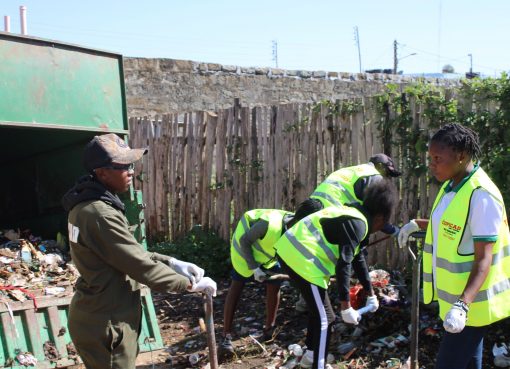The Government has set aside Ksh 200 million for procurement of aflasafe -chemical to contain the spread of aflatoxin in the country.
Aflasafe chemical will be able to address the spread of aflatoxin in food crops which pose grave health risks to both humans and animals even at very low concentrations
Agriculture Cabinet secretary Mwangi Kiunjuri confirmed that Government will use the Ksh 200 million, out of the 2 billion budget line, as a subsidy fund set aside to distribute aflasafe to small scale farmers in the country.
The CS who was speaking when opening up the Sh 130 million state of the art factory at Katumani in Machakos County to produce Aflasafe KE01 said the government will also intensify campaigns to farmers to induct them how to use aflasafe so that they can produce safe food.
Kiunjuri explained that Government focus is geared towards promoting production of safe food in order to contribute to reduction of major diseases facing Kenyans.
“Contamination and production of aflatoxins makes production of crops such as maize and groundnuts unsuitable for use as food and also feed,” he said adding that now there is a sure way of ensuring food that is being produced in the country is safe.
The CS said that National Government will partner with counties and other value chain players to ensure farmers access the chemical at an affordable price.
“We shall try to subsidize especially for the 10 hotspot counties who require about Sh 2.5 billion, and if today we agree with counties and set aside money on 50/50 basis on both sides as a way of partnership we can fully sensitize and support farmers,” Kiunjuri said.
Some of the major hotspots include Makueni, Machakos, Kitui, Kilifi, Kwale, Meru, Embu and Tharaka Nithi.
He also confirmed that during the distribution of fertilizer, this time round farmers will also be supplied with lime to help in reducing high acidity levels in soils.
“The supply of aflasafe will be piloted in five counties mainly the hotspots and the same will be extended to coffee growing regions,” Kiunjuri said.
Currently, the chemical factory price stands at Sh135 per kilogramme and Sh 200 at the agro-dealers and contracted distributors. Farmers, Kiunjuri said are required to apply 4-kgs for one acre.
The facility was established in 2015 by Kenya Agricultural and Livestock Research Organization (KARLO) in conjunction with the International Institute of Tropical Agriculture (IITA), an award winning international research for development organization.
Researchers from the two organizations stated that more than 70 percent of Kenyans are chronically exposed to aflatoxin raising fears of increase in their health bill and food insecurity.
Kiunjuri observed that owing to farmers not being able to observe good farming techniques, low soil tests and lack of pesticides has led to high presence of aflatoxins in food crops raising fears of food insecurity and human diseases mainly cancer.
Aflatoxin is highly prevalent in the country, contaminating up to 65 percent of the country’s maize and groundnut crops. In 2010, the CS noted over 2.3 million bags of maize were condemned and destroyed because of high aflatoxin contamination levels, costing the government more than Sh 6.9 billion.
Currently, KALRO director General Eliud Kireger confirmed the facility has currently 120 tonnes of Aflasafe products in stores and the KARLO is working out logistics to have it distributed to farmers.
The facility the second in Africa after Nigeria is also developing Aflasafe for the other East African countries.
Patrick Wilson, Deputy Mission Director for United States Agency for International Development (USAID) Kenya and East Africa, said the establishment of the factory is the culmination of many years of hard work and partnership with key value chain players.
“Contamination and production of aflatoxins is a global phenomenon but its presence level depend on strategies value chain players are fast tracking to tame them,” said Wilson.
Over the years Wilson confirmed that his organization has invested in Ksh850 million which includes Sh 450 million for the factory to fight aflatoxin in the Country.
In addition to consistently using aflasafe, Wilson emphasized on the need for millers to practice good post-harvest handing, sound storage facilities and install efficient processing machines.
“This facility is a first of its kind in East Africa demonstrates how Kenya now has the opportunity lead the region. Tanzania, Malawi, Rwanda and Ethiopia have taken note and moving towards aflasafe production in their countries in partnership with the private sector,” Wilson said.
In Kenya, maize is recognized as a key contributor to food security, serving the staple food needs of more than 90 percent of the population. With a national production of 40 million bags and a consumption of 52 million bags, the country perpetually experiences a maize deficit.
The government aims at increasing this production from the current 40 million to 67 million bags by 2022. However, to do this challenges such as aflatoxin contamination need to be addressed.
By Wangari Ndirangu





